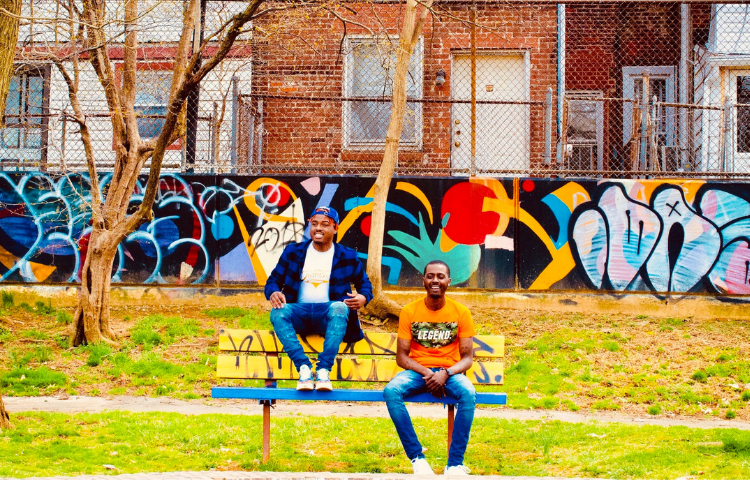Cartier “Carty” Perkins of the BlumBros was six years old when Pennsylvania’s Department of Human Services (DHS) workers barged into his school and took him from class. Nine of his 10 siblings, including Raphael “Raphy” Perkins, were placed in a group home after their mother’s drug abuse was discovered. The siblings remained together for a few short weeks before they were split into twos and carted off to different foster care homes. Growing up, they would only see each other on major holidays and birthdays.
Once the brothers became adults and aged out of the system, they were allowed to reunite on their own terms. However, Carty and Raphy wouldn’t form the deep connection they currently have until music changed their lives. After a falling out with his girlfriend, Carty moved into his sister’s home where Raphy was staying. The two were experimenting with different beats on the front porch when their cousin Reuben was inspired to pay for a professional studio session. Carty’s single “One Beat Wrong” gained the attention of the duo’s manager Todd “Morty” Perri II, who encouraged Raphy to jump on the song’s second verse.
“From there, he made us a duo,” Raphy told Blavity. “Before that, we weren’t really close at all. Me and Carty started to get to know each other and built a bond from there.”

Reunified, the brothers began to notice their similarities, particularly their love for music, lyrical methods and their natural aptitude for dance.
“I don’t know if it’s a genetic thing, but we think the same when it comes to music,” Carty said. “It’s a good connection — like it was supposed to be.”
Outside of music, when the two shared stories of their time apart, they found startling parallels. Each of them bounced around between different foster care homes: Raphy lived in three or four, while Carty found himself in six. With the new homes came new schools, new teachers and new friends. Money was often an issue wherever they went; whether it manifested in foster parents complaining about the government not sending enough to properly care for them, or parents who misused what they were given. Regardless, mistreatment — especially in regard to their race — reared its head the same way.
“I was placed in foster care with all white kids, and I felt like I was being treated wrong,” Raphy said. “One foster home [I was placed in] was good, and the rest were crazy. It didn’t do anything but make me build up anger throughout the years.”

“The whole system is messed up,” Raphy said, sharing a similar sentiment. “You see a difference when they have other kids in the house and they’re blood [related], from cell phones and bikes to food. Everything is different.”
Carty expressed a systemic need for more extensive background checks, recounting some parents who were getting high and engaging in other inappropriate activities while children were in their care. Meanwhile, Raphy recalled foster parents who spent little to no amount of the checks they received, which is designated as compensation for childcare, on those they were caring for.
“[Parents] are supposed to give the whole check to the child to take care of them, make sure they get their supplies for school, have clothes on their back — all that,” Raphy said. “Some parents don’t do that. They will spend the entire check, and won’t put nothin’ on you, and say, ‘Oh, it just says you need a roof over your head and a shirt and some shoes.’”
The idea of reaching out to their assigned DHS worker has both men doubtful.
“They don’t always believe you because you’re young,” Raphy said.
Furthermore, if the child has a behavioral issue, which is often exacerbated by the foster care system, Carty believes chances of a DHS worker helping grow even slimmer.
“It’s easy to get over on kids with behavior problems,” Carty said. “[There’s] a whole bunch of kids who got behavior problems, and they’re overlooking the fact that they have mental issues. Instead of helping them, they’re punishing them. My punishment was to take the fan out of the room — like, no air. Like, what the hell?”

While their next home was never certain, the brothers shared an enduring love for music that they now hope to use as a platform for the thousands of children who remain in foster care.
“The main thing is to show that you can be in the system, and [you’re] more than just being in the system,” Carty said. “You can be something at the end of the day. You can be separated from your family, like me and Raphy, and there can still be a good outcome.”
“We want people to know that we’re two foster kids who came from nothing, and we showed the world that we can be unstoppable,” Raphy added. “Carty and I wanted to speak for the kids, and let the kids speak for themselves.”
Named after the Blumberg Projects where they were raised, the BlumBros were signed by PayDay Records in 2018. Their debut EP Thank Da Jects pays homage to part of their childhood. The duo is also in the process of releasing a new song every six weeks on Tidal, Spotify, YouTube – almost anywhere you can find music. They know their direction. These two Philly foster boys-turned-men, who so often didn’t know where they’d be placed next, now have full control as they steer themselves to the top of the charts.
